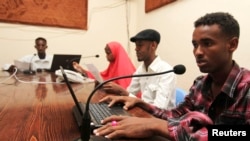A new United Nations report warns restrictions on freedom of expression threaten Somalia’s political transition to democracy after decades of conflict and violence.
Produced jointly by the U.N. Assistance Mission in Somalia and the Office of the U.N. High Commissioner for Human Rights, the report documents widespread violations in Somalia against journalists, human rights defenders and political leaders, including numerous killings, arbitrary arrests and detention, intimidation and closure of critical media outlets.
Cecile Pouilly is spokeswoman for the U.N. High Commissioner for Human Rights. She tells VOA these targeted violations are aimed at squelching freedom of expression and critical opinion.
Under attack
She says al-Shabab rebels prohibit all journalists from operating in areas under its control and target media workers across the country. But, she says federal and state security forces pose the greatest threat to media workers and political activists.
“It is a key concern that remain in Somalia that journalists cannot operate more freely," she said. "Over the last six months there is a new trend that seems to appear in a couple of states in Somalia, which is that journalists are being harassed in the streets and physically and verbally abused by unidentified men. So, we really see that this is a danger for journalists, for freedom of expression and for democracy at large.”
Over the past four years, the report notes 30 journalists and 18 parliamentarians have been killed in Somalia. It also documents 120 cases of arbitrary arrest and detention of media workers between January 2014 and July 2016.
Weak judiciary
Pouilly says such crimes are rarely punished because Somalia’s judiciary is very weak.
“One of the key concerns is about the independence of the justice system because it is still very much guided by clan-based politics. It also suffers from corruption," she said. "There is very limited oversight. And, as a result, there is very limited accountability for all violations of freedom of expression.”
Pouilly says clan elders also are the main obstacle to women’s participation in political and public life.
She says the Somali government has seen the report and is taking its findings and recommendations seriously.
Pouilly says the U.N. is encouraged by this response and is urging the authorities to take quick action to ensure freedom of expression and to make Somalia a truly participatory democracy.




